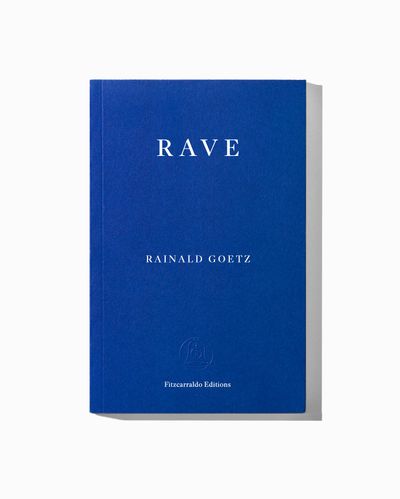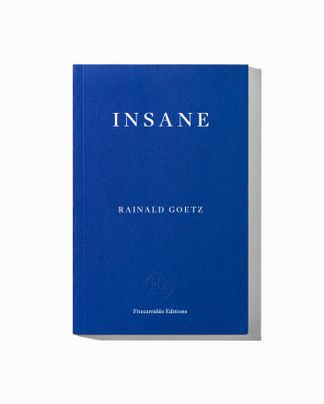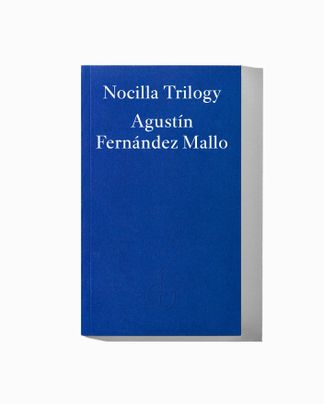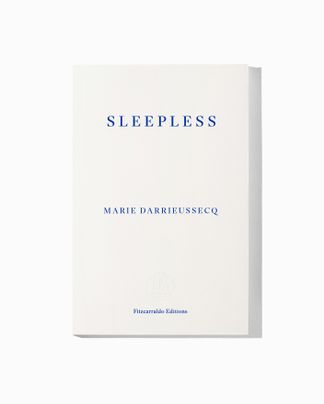‘Meet girls. Take drugs. Listen to music.’ In Rave, cult German novelist Rainald Goetz takes a headlong dive into nineties techno culture. From the cathartic release on the dance floor to the intense conversations in corners of nightclubs and the after-parties in the light of dawn, this exhilarating, fragmentary novel captures the feeling of debauchery from within. Dazzling and intimate, Rave is an unapologetic embrace of nightlife from an author unafraid to lose himself in the subject of his work.

Rave
Translated by Adrian Nathan West
French paperback with flaps, 264 pages
Published 1 July 2020
Rave
Translated by Adrian Nathan West
I
COLLAPSE
‘The collapse begins.’
… and came up to me in slow motion. I looked, longed, walked, and thought.
I had a feeling of lightness.
Maybe I could make a decision.
‘The driver’s licence is gone now, now I’ll write the book fast.’
Wirr: there I was standing in the middle of the music. – Thrust.
Right away Laarman had secured the film rights for the Schütte saga for some fantastical sum. The money was gone, the accounts closed, the cards cancelled.
I saw him, how he stood there with a young woman behind the pillar, and suddenly he looked to me like a giant. He talked with her, talked past her: really they were talking over one another. Everything friendly, warm, roused.
My face was soaking wet already too.
We went to the other room in the back.
SWEET CONFUSION
You’ve got to imagine so-and-so as a happy person.
Who was that again?
We looked around and laughed. Dope music now.
‘Hey! Look!’
I had the sixteenth notes popping superlight in my fingertips, arms thrown out wide. Them too, teeny tiny glittering forward, up, down, cool.
The glistening jewellery shimmered silver.
Schütte to Wirr: ‘Where?’
When a person said the toilets, they didn’t necessarily mean somewhere else. The searcher was calm, even when speaking, interpreter in the wordlessness of faces or gazes. The searcher is there, searching for signs.
Who’s taking what?
Who’s still got some?
Who can still make something happen?
Who’s there?
It was the time of the linden blossoms.
Then Mark heard someone close by say the words: ‘The state prosecutor is now investigating on suspicion of breach of confidentiality.’
And right away I thought: ‘Fantastic.’
And I had Albert’s truth-testaments, his drawings, I mean, which were a visible manifestation, from oblique angles, of the collision of temporal planes.
Pausing and pounding.
Then I saw how she –
And turned –
And new glances all round. I laughed, because –
I don’t exactly know –
And turned. ‘What’s up.’
Ah, right, sure. Cool.
OK.
Behind, above, around: enormous now, the supremacies of sound had risen up, giant machines, bigger than a person, that shot thunder through to his insides. He looked up, nodded, and felt like an idea borne of the boom-boom-boom of the beat. And the immense boom-boom said: one one one –
and one and one and –
one one one –
and –
cool cool cool cool cool…
He saw Hardy and Leksie, faces and eyes, hurtled, scrambled, shoved, shaken in the midst of the rhythm. Saw broken and blessed, trusting and tender, myriad signs, quick, terse, plain, each blotted out by the next in waves of sympathy. He looked and danced and saw beauty.
From the margins came legs and light, feet, flashes, paces and bass, surfaces and murmurs, equivalencies and functions of a higher mathematics.
He himself was the music.
(…)
‘Goetz’s writing is a kind of dancing. Each sentence, fragment, captures the essence of what it’s like to live inside the spaces of techno music. Thoughts come and go, and return louder, later in the text, with an urgent rhythm that makes the cumulative case for the transformative power of the dance floor. This is writing of and from the body, hot, sweaty, dazed, decadent, and ultimately life-affirming.’
— Julia Bell, author of The Dark Light
‘Rave matches [Bernhard] with its pitch-black humour and philosophical intensity. Questions of interiority, the external world, language and meaning are opened up within its circuit of pills and beats and clubs, like a genuinely meaningful drug trip.’
— Financial Times
‘In Rave, Goetz makes an electrifying portrait of what happens when you dedicate your life to the night, to the bass and the rhythm, when you party nonstop and rave like there is no tomorrow…. What makes Rave so effective is that Goetz chronicles the tenor of rave culture’s endless cycle. The reader becomes part of the weekends of excessive indulgence, the “cracked” out week after, and the intrigues that linger…. I often felt a contact high reading Rave.’
— Shane Anderson, Los Angeles Review of Books
‘Spilling out and trying to contain, understanding and rejecting the offered narratives – this is all part of a push and pull we use to learn about the self. It’s in this madness, and not aside from it, that Goetz thrives.’
— BOMB
‘This mid-rave feeling of being utterly present, devoid of any sense of time, place, or ego, is exceedingly difficult to capture in any sort of strictly representational art form, but German writer Rainald Goetz’s 1998 novel Rave manages to convey the black hole of a dissociative dance floor experience with clarity. Newly translated by Adrian Nathan West, Rave avoids the saccharine tropes that most writing about dance music succumbs to, whether it be the glorification of excess, the distorting effects of nostalgia, or ham-fisted descriptions of euphoria…. Goetz’s novel succeeds in translating into black and white an embodied and ineffable experience, something prose isn’t especially equipped to accomplish.’
— Rachel Hahn, The Nation
‘Goetz’s achievement in Rave is a book about clubbing that avoids the usual cliches. This is due not least to his inventive syntax, which freely mixes first, second and third person voices along with present and past tenses and fragmentary paragraphs (translated with panache by Adrian Nathan West)…. Rave is a cocktail of Céline, Bolaño and Döblin that brings it luridly to the page.’
— Liam Cagney, Irish Times
‘The ambition of his experimentation sometimes pays off. The fragmentary narrative can just about evoke, if you let it, something of the disorienting experience of being at a rave. It might not be what it’s ”really like”, it might not even be particularly enjoyable, but it gets close to the echo of a vibration on the morning after, and the sweet and dusty taste of the fog machine at the back of your throat – the closest most of us have been to a real rave in a long time.’
— Harry Strawson, London Review of Books
‘For those who can make peace with its radical incoherence, Rave will blossom into an evocative and lyrical work…. Rave is not a sombre book. Goetz seductively renders the intangibility and promise of the chemical night, and when the chill of awakening sets in, he romantically intensifies the splendour of what came before.’
— Rob Doyle, Times Literary Supplement
‘Goetz employs a digressive quantity of scenes, within which his insights about dance music culture remain extraordinarily sharp…. Rave distills a specific time in the mid-90s when the subculture had become an industry. Goetz’s respect for dance music lies not in how his characters occupy or regard it, but in the flux of the novel’s mercurial structure…. Beyond his admiration for craft, he is touching as a witness to our helpless need to connect … in an extraordinary year … the experience of reading Rave is a cruel suspension between agony and ecstasy.’
— WIRE
‘To sample an old saying: if you can remember the nineties, you weren’t there. Rainald Goetz was there, and found a form in which to summon the sensations and sounds, the highs and the bass, of techno culture. This is a classic cut from a fabled era that will enrich the mix of today’s rave culture – and fills in the memory hole for some of us old-timers’
— McKenzie Wark, author of The Beach Beneath the Street
‘This time it’s not blood dripping on his text, but the nocturnal sweat of the techno dancer. Goetz’s great achievement is, above all, to have translated the thudding rhythm of this new music into rhythmic language’
— Frankfurter Allgemeine Zeitung
‘Likewise, Rave is an all-consuming experience. It’s a challenging read. For anyone who was there, though, it will most likely be worth it.’
— Lunate
‘The stories this book tells … are not stories as such, but stages of a ritual that conjures up, and attempts to reproduce in writing, the sacred, soulful state of being-in-music.’
— Berliner Zeitung
‘A must-read.’
— Vogue
‘Goetz is capable like none other of drawing on distinct registers that enable him to speak without intellectual aloofness from inside this unique world while at the same time interpreting it theoretically.’
— Frankfurter Rundschau
Rainald Goetz, born in 1954 in Munich, studied History and Medicine in Munich and obtained a doctoral degree in both subjects. He briefly worked as a doctor, but quit this profession for the sake of literature in his early thirties. His first novel, Insane, was published in 1983. In 1998, Goetz wrote the internet diary ‘Rubbish for Everyone’, probably the first literary blog in Germany, with entries on the world of media and consumerism. It was published in book form in 1999 and together with Rave, Jeff Koons, Celebration and Deconspiration belongs to This Morning, his great history of the present. Goetz has been awarded numerous prizes, most notably the Georg Büchner Prize in 2015. He lives in Berlin.
Adrian Nathan West is the author of The Aesthetics of Degradation and translator of such authors as Pere Gimferrer, Juan Benet, Marianne Fritz, and Josef Winkler. His writings appear regularly in the Times Literary Supplement, Los Angeles Review of Books, the Literary Review, and many other publications.




